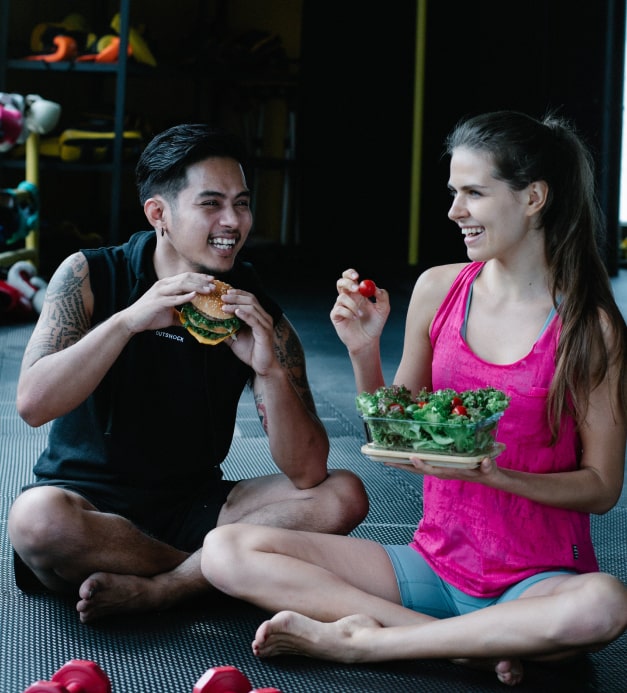Resources
Doctor approved. Evidence-based advice. Healthier, happier you.
Pre exercise and mistakes
6 Pre-Workout Nutrition Mistakes That Mess With Your Fitness Results
Outside of picking which playlist to blast on your way to the gym, there’s a host of additional ways to prep for a great workout. At the top of the list: how you fuel your body.
“Working out typically requires some sacrifice, so it’s very important to obtain the best results possible—and that means pre-fueling properly,” says registered dietitian Mallory Aldred R.D., founder of What Mallory Eats. Failure to eat right ahead of your workout can lead to a real lack of energy at the gym, which increases the likelihood that you’ll either stop mid-way through or fall short of the intensity needed to inch you closer to your goals, she says.
But eating before a workout isn’t as simple as, well, eating. Fueling optimally requires some savvy and discipline. Ahead, sports nutritionists break down the most common pre-workout nutrition mistakes they see, plus how to transform a gaffe into a win.
Mistake #1: You Don’t Eat At All
Pre-workout snacks have a purpose: To provide you with the energy you need to get through your workout, says sports dietitian Amy Goodson, M.S., R.D., C.S.S.D., L.D., author of The Sports Nutrition Playbook. Carbs are a key element here. Your body uses carbohydrates to keep you moving and grooving in and out of the gym, the way a car uses gasoline to get from point A to point B. If too much time has passed since your last meal, your body will not have any readily available carbohydrates to use for fuel, explains Goodson. As a result, your body will be forced to use stored fat as energy—or, if you have very low body fat, break down your muscle into protein for fuel (which you don’t want).
Here’s the thing: While the body can burn fat and protein for fuel, it cannot do so as efficiently as it can with carbohydrates. As such, if you don’t eat some form of carbohydrates ahead of exercise, you may not perform at your best, she says.
Early morning exerciser? If you’re hitting a lower-intensity workout, like a gentle flow or walk, it’s okay to forgo food if you feel energized enough without it, says Goodson. However, if you’re hitting something heavier or higher in intensity at sunrise, she recommends noshing on a banana or a slice of toast before getting after it.
When you’re not sweating at the crack of dawn, make an effort to consume a bigger snack with carbohydrates and protein 30 to 60 minutes ahead of your workout, Goodson advises. (Play around with the timing to see what works best for your digestive system.) “Some whole-grain crackers with string cheese, a banana and beef jerky, Greek yogurt with berries and granola, or an energy bar with an approximate ratio of three-to-four grams of carbs to every one gram of protein are all good bets,” she says.

Mistake #2: You Eat The Same Food Before Every Type of Workout
As a general rule, a pre-workout snack should feature a combination of carbohydrates for immediate energy and protein for muscle recovery and growth, says registered dietitian and exercise physiologist Jim White, R.D.N., owner of Jim White Fitness & Nutrition Studios. However, “the exact quantity and proportion of each of those macronutrients should vary based on individual needs, type of sport, and the intensity and duration of the workout,” he says.
If you’re working out for longer than 30 minutes or hitting a moderate to high intensity, start with a foundation of 100 or more grams of carbohydrates and 15 to 20 grams of protein, White suggests.
From there, ramp up the protein if your goal is to put on muscle mass or you’ll be strength training. The presence of protein—or, more specifically, the presence of the building blocks of protein, amino acids—in the bloodstream helps the body initiate muscle repair after a workout more quickly, he explains. The faster your recovery from a lifting session, the sooner you’re able to hit another with the intensity that you need to keep getting stronger. Over time, this means faster gains.
4 Post-Workout Game-Changers For Maximum Muscle Recovery
Just note that protein is slightly slower-digesting than carbohydrates, so too much protein ahead of endurance or cardiovascular workouts can make you feel slow and sluggish. Since strength training involves less jostling and juggling, people can tolerate more protein before a lifting session.
Of course, if you’ll be working for over an hour, you’ll want to restock on carbohydrates (to the tune of 30 to 60 grams per additional hour), according to dietitian Rebekah Blakely, R.D.N. The additional carbs ensure your muscles have the fuel to keep performing at their best.
Mistake #3: You Eat Foods That Induce GI Distress
It goes without saying that if you feel gassy or nauseous, you won’t have as good of a workout as you would if you were feeling A-OK. While everyone’s digestive tract responds differently to different foods, it’s generally best to avoid high-fiber and high-fat foods ahead of exercise, says Goodson.
Fiber is great for your overall health and gastro-wellbeing, but fiber-dense foods take longer to digest, she says. Similarly, it requires more energy to digest fat than carbohydrates and protein. In fact, the body redirects blood away from your limbs and to your digestive tract to work on that fat and fiber, she explains.
If you don’t give fat and fiber enough time to digest before hitting the gym, two things can happen. First, you can end up feeling too stuffed to train, says Goodson. Second, blood being directed away from your muscles can mean they don’t get the nutrients or oxygen they need to function optimally. “That’s not to say you can’t have a piece of whole-grain bread (some fiber) with peanut butter (some fat),” she says, “but don’t go eating fried chicken strips and gravy and expect to feel great during a workout.”
Goodson also recommends avoiding foods that contain garlic, pepper, and lots of spice. Pre-workout snacks that contain these and other acidic or flavor-rich ingredients are more likely to cause heartburn. Naturally, it is hard to go hard when trying to breathe through a burning sensation in your chest and throat.
Mistake #4: You Don’t Eat Enough
Not hitting the gym for another three hours? You need to eat more than a snack! “It’s best to consume a pre-workout snack one to three hours before your workout,” says White. (Exactly how big of a snack you opt for should vary based on which end of the spectrum you’re on.) Any longer than that, and your body has time to digest a full meal before you hit the gym—even if that meal is replete with some fat and fiber.
Eating enough overall is essential for maximizing strength and performance. So, if you are skimping on your pre-workout meal and your overall calorie intake takes a hit, that interferes with your ability to reach your fitness goals, says White.
So how do you figure out how much to eat before your workout? First, consider overall daily calorie needs (you can use an online calorie calculator to figure this out). The more calories you need to consume each day, the more calories you’ll want to consume ahead of your workout. Next, figure out how much longer until your workout. If you’re planning to hit the gym shortly, 200 to 300 calories is sufficient. If it’s going to be a few hours, you can have two or even three times that—yes, that’s 400 to 900 calories—assuming it makes sense within your overall daily needs.
Mistake #5: You Underestimate The Power of Caffeine
If you’re feeling slugging at the gym or otherwise unmotivated, consider trying one of the most-studied performance-enhancing drugs out there: caffeine.
One study published by the British Journal of Sports Medicine found that those who drank a cup of joe before a 1,500-meter run ran faster than those that forwent coffee. Meanwhile, one study published in the Journal of Applied Physiology found that people who had a cup of coffee ahead of their workout generally enjoyed exercising more than those who didn’t.

How Fast Do You Metabolize Caffeine?
Ultimately, whether you can or should ingest caffeine ahead of your workout depends on your personal tolerance to caffeine, as well as the time of day you’re exercising. However, if you are exercising in the earlier part of the day your digestive system can handle it, Goodson recommends using that cup of coffee to your advantage. “Caffeine stimulates the central nervous system, lessens feelings of fatigue, and can improve performance when consumed in the right dose,” she says
If you don’t like coffee, another option is to try a pre-workout supplement. “Many energy drinks and pre-workout supplements contain caffeine as well as other ingredients that are also central nervous stimulants,” says Goodson. Just note that she recommends starting with half (or less) of the recommended serving size the first time you try any new pre-workout supplement, since its particular combination of caffeine and other stimulants could leave some people feeling lightheaded, dizzy, and even nauseous. If you tolerate the partial dose, you can increase it.
Mistake #6: You Don’t Follow Through
Yes, eating ahead of exercise is essential—but so is eating afterward. Fail to fuel after the gym and much of your hard work will be for naught as your muscles won’t have the tools they need to properly recover, says Harcoff. When this happens, you won’t be physically able to hit it hard the next time you go to the gym, which isn’t ideal, no matter what your specific gym goals are.
While you want a little bit of protein and a lot of quick-digesting carbohydrates before a workout, afterward you want a lot of protein and some complex carbohydrates, says certified strength and conditioning coach Jake Harcoff, C.S.C.S., owner of AIM Athletic. “Post-workout, the carbohydrates act quickly to restore and replenish the muscle glycogen that was depleted, while the proteins are broken down into amino acids, which can be repurposed and utilized to repair and build new muscle tissue,” he explains.
Your move: Even if you ate a full meal before your sweat, whip up a post-workout snack, too. Aim for at least 30 grams of protein (especially if you’re focused on muscle) and 90-plus grams of carbohydrates. A protein shake, cold-cut sandwich, cottage cheese with fruit, and grilled chicken breast with rice (and seasoning, of course) are all good options here.